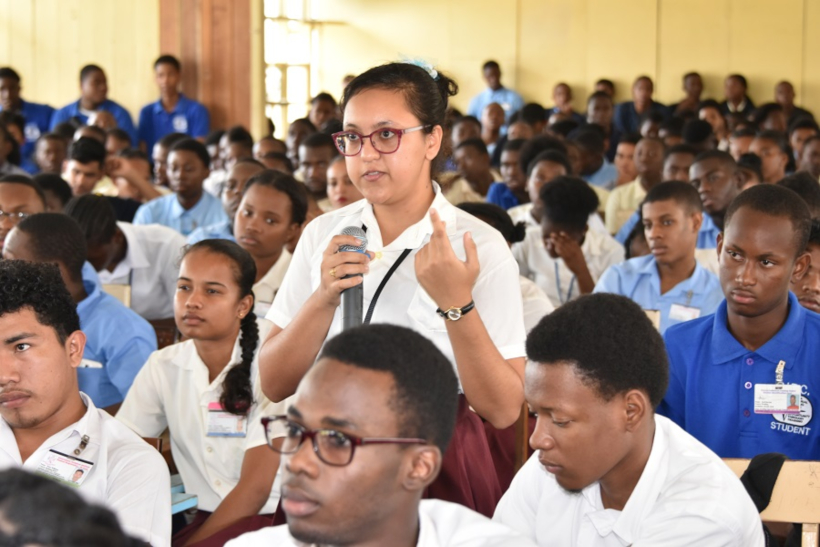Director of the Department of Energy, Dr Mark Bynoe, yesterday told students of the Government Technical Institute (GTI) and the Guyana Industrial Training Centre (GITC) that training, skills building, and certification are necessary in order for them to benefit from the opportunities that are becoming available as the oil and gas sector emerges.
Dr Bynoe was at the time engaging the students at an interactive session hosted at GTI’s Woolford Avenue, Georgetown location.
“Training and skills building and certification are necessary. In short, competency. It doesn’t matter what else you have. Too many of us are of the opinion that once [you] have a certificate it doesn’t matter where it came from; it doesn’t matter how long [you’ve] had it. It must be relevant. You need to keep pursuing…and ensuring you are competent for the industry. Advise your constituents…your family and friends, for careers not only in oil and gas but also for careers in transformation,” he said.
Dr Bynoe noted that the main objective of the interaction was to raise awareness among young persons about the sector and what it has to offer. As such, he implored the youths not to horde their knowledge, but instead to share it as each individual’s self-determination is in their own hands.
“You have to make the effort now if you’re going to really possess that future tomorrow, and so just being at GITC or GTI is a step in the right direction. [However,] you are not going to become experts [by] just graduating from GTI tomorrow, and not because you step out with a certificate somehow you know it all. Training never stops… If you don’t continue to be relevant, the future will pass you by,” he said.
The Energy Director also made it clear that he was not referring only to oil and gas, but those opportunities beyond the sector, and how the revenues accrued can be used to enhance economic, social and physical development.
“So, we need to build awareness…Seek to inform yourself. The information doesn’t stop here today. This is just scratching the surface, which we hope will whet your appetite which will then encourage you to seek out and to inquire even further. You have to think beyond what your eyes can possibly see today,” he said.
Dr Bynoe told the students that at this current stage they are well-positioned to participate and that their level of investment will determine how many benefits redound to them.
“So you have to ensure that you are not only positioning yourselves, but you are positioning yourselves for tomorrow, for next week, for next year, and for five years,” he said.
He noted too that Technical and Vocational Educational (TVET) institutions such as the GTI and GITC also have a role to play as their main objectives are to boost competency and efficiency.
“I speak about competency because it’s not just [about]…doing a programme. It’s doing a programme which will position you for tomorrow,” he emphasised.
Meanwhile, Council for Technical and Vocational Educational Training (CTVET) Director, Mr Floyd Scott, expressed similar sentiments. He explained that the Caribbean Vocational Qualification is the key to the CARICOM Skill Certification, which allows the students to obtain the completion of the competencies in their particular skilled area or occupation.
This is the ninth interactive session hosted by the Department to increase awareness among stakeholders and to foster their interest and participation in the sector.













